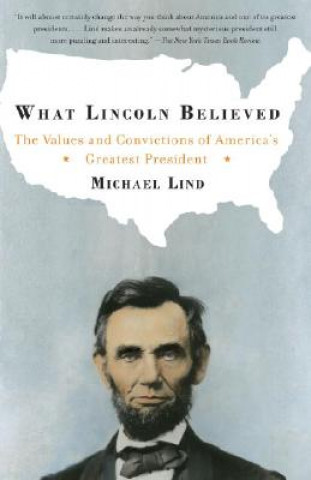
Kód: 12050655
What Lincoln Believed: The Values and Convictions of America's Greatest President
Autor Michael Lind
Few biographers and historians have taken Lincoln's ideas seriously or placed him in the context of major intellectual traditions. In "What Lincoln Believed, the most comprehensive study ever written of the thought of America's mo ... celý popis
- Jazyk:
 Angličtina
Angličtina - Väzba: Brožovaná
- Počet strán: 358
Nakladateľ: ANCHOR, 2006
- Viac informácií o knihe

21.80 €
Bežne: 25.10 €
Ušetríte 3.30 €

Skladom u dodávateľa
Odosielame za 15 - 20 dní
Mohlo by sa vám tiež páčiť
-

She Who Remembers
12.57 € -4 % -

Lawrence Police Department
21.70 € -17 % -

Plainsboro
21.70 € -17 % -

God Chasers: Interactive Study Guide
14.70 € -19 % -

Hummingbird on the Left
18.76 € -18 % -

Twinkle, a Christmas Story
13.18 € -13 % -

The Life and Adventures of John A. Murrell, the Great Western Land Pirate
30.73 €
Darujte túto knihu ešte dnes
- Objednajte knihu a vyberte Zaslať ako darček.
- Obratom obdržíte darovací poukaz na knihu, ktorý môžete ihneď odovzdať obdarovanému.
- Knihu zašleme na adresu obdarovaného, o nič sa nestaráte.
Viac informácií o knihe What Lincoln Believed: The Values and Convictions of America's Greatest President
Nákupom získate 54 bodov
 Anotácia knihy
Anotácia knihy
Few biographers and historians have taken Lincoln's ideas seriously or placed him in the context of major intellectual traditions. In "What Lincoln Believed, the most comprehensive study ever written of the thought of America's most revered president, Michael Lind provides a resource to the public philosophy that guided Lincoln as a statesman and shaped the United States. Although he is often presented as an idealist dedicated to political abstractions, Lincoln was a pragmatic politician with a lifelong interest in science, technology, and economics. Throughout his career he was a disciple of the Kentucky senator Henry Clay, whose "American System" of government support for industrial capitalism Lincoln promoted when he served in the Illinois statehouse, the U.S. Congress, and the White House. Today Lincoln is remembered for his opposition to slavery and his leadership in guiding the Union to victory in the Civil War. But Lincoln's thinking about these subjects is widely misunderstood. His deep opposition to slavery was rooted in his allegiance to the ideals of the American Revolution. Only late in his life, however, did Lincoln abandon his support for the policy of "colonizing" black Americans abroad, which he derived from Henry Clay and Thomas Jefferson. Lincoln and most of his fellow Republicans opposed the extension of slavery outside of the South because they wanted an all-white West, not a racially integrated society. Although the Great Emancipator was not the Great Integrationist, he was the Great Democrat. In an age in which many argued that only whites were capable of republican government, Lincoln insisted on the universality of human rights and the potential fordemocracy everywhere. In a century in which liberal and democratic revolutions against monarchy and dictatorship in Europe and Latin America repeatedly had failed, Lincoln believed that liberal democracy as a form of government was on trial in the American Civil War. "Our po
 Parametre knihy
Parametre knihy
21.80 €
- Celý názov: What Lincoln Believed: The Values and Convictions of America's Greatest President
- Autor: Michael Lind
- Jazyk:
 Angličtina
Angličtina - Väzba: Brožovaná
- Počet strán: 358
- EAN: 9781400030736
- ISBN: 1400030730
- ID: 12050655
- Nakladateľ: ANCHOR
- Hmotnosť: 281 g
- Rozmery: 204 × 133 × 21 mm
- Dátum vydania: May 2006
Obľúbené z iného súdka
-

Berserk Deluxe Volume 1
44.42 € -12 % -

Berserk Deluxe Volume 2
52.23 € -22 % -

Haunting Adeline
30.73 € -

Cry Baby Coloring Book
9.83 € -13 % -

Hunting Adeline
31.74 € -

Berserk Deluxe Volume 3
48.89 € -3 % -

The Official Stardew Valley Cookbook
23.32 € -19 % -

Atomic Habits
16.32 € -29 % -

Powerless
11.96 € -7 % -

Berserk Deluxe Volume 4
46.55 € -8 % -

Chainsaw Man, Vol. 15
10.44 € -19 % -

White Nights
3.54 € -

Gravity Falls Journal 3
18.35 € -13 % -

Harry Potter and the Prisoner of Azkaban (Minalima Edition)
35.09 € -14 % -

House of Leaves
23.22 € -22 % -

JUJUTSU KAISEN V22
10.34 € -23 % -

Iron Flame
16.22 € -25 % -

No Longer Human
13.48 € -16 % -

Dungeons & Dragons Essentials Kit (D&d Boxed Set)
30.12 € -

Surrounded by Idiots
10.74 € -10 % -

Twisted Love
9.83 € -24 % -

A Little Life
17.54 € -

Berserk Deluxe Volume 5
50.51 € -

Fourth Wing
10.24 € -14 % -

Reckless
11.76 € -18 % -

BALLAD OF SWORD & WINE QIANG JIN JIU V01
16.63 € -21 % -

Bungo Stray Dogs, Vol. 8 (light novel)
16.63 € -

Twisted Lies
9.83 € -17 % -

Don't Believe Everything You Think
13.79 € -15 % -

The 48 Laws of Power
24.54 € -9 % -

Twisted Games
9.83 € -17 % -

Court of Thorns and Roses Paperback Box Set (5 books)
50.10 € -20 % -

Heaven Official's Blessing: Tian Guan Ci Fu (Novel) Vol. 1
18.05 € -15 % -

Court of Thorns and Roses
9.22 € -22 % -

Berserk Deluxe Volume 6
51.12 € -

New Happy
22.92 € -19 % -

Heaven Official's Blessing: Tian Guan Ci Fu Vol. 4
18.66 € -12 % -

The Creative Act
24.03 € -12 % -

Court of Mist and Fury
9.42 € -18 % -

Vagabond (VIZBIG Edition), Vol. 2
26.37 € -7 % -

Twisted Hate
10.13 € -15 % -

Icebreaker
9.12 € -23 % -

Harry Potter and the Chamber of Secrets: MinaLima Edition
30.02 € -16 % -

The Laws of Human Nature
16.02 € -4 % -

Dune Messiah
9.02 € -20 % -

CHAINSAW MAN V14
11.25 € -

Heaven Official's Blessing: Tian Guan Ci Fu (Novel) Vol. 2
18.76 € -11 % -

Berserk Deluxe Volume 7
48.07 € -5 % -

Little Mushroom: Judgment Day
17.13 € -18 %
Osobný odber Bratislava a 2642 dalších
Copyright ©2008-24 najlacnejsie-knihy.sk Všetky práva vyhradenéSúkromieCookies


 21 miliónov titulov
21 miliónov titulov Vrátenie do mesiaca
Vrátenie do mesiaca 02/210 210 99 (8-15.30h)
02/210 210 99 (8-15.30h)